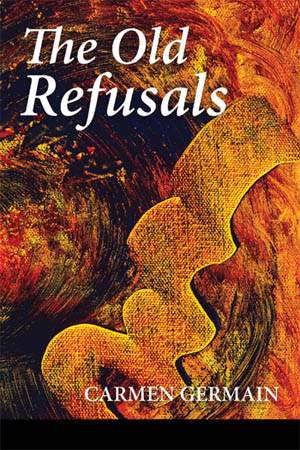Carmen Germain


Holding degrees in literature from the University of California, Santa Cruz, and the University of British Columbia, Carmen Germain is the author of the chapbook Living Room, Earth (Pathwise Press), the collections These Things I Will Take with Me (Cherry Grove), and The Old Refusals (MoonPath Press). Poems have appeared in various anthologies, including In a Fine Frenzy: Poets Respond to Shakespeare (University of Iowa Press), and New Poets of the American West (Many Voices Press). Fifth Wednesday, The Madison Review, Cold Mountain Review, Poet Lore, Natural Bridge , and Flyway, among others, have published her work. While on sabbatical as a visiting artist/scholar at the American Academy in Rome, she researched the work of the post-war novelist Elsa Morante.
She grew up near the Mississippi in rural Wisconsin and worked in Washington, D.C., Montana, and California before making her home in the Elwha River valley, Olympic Peninsula. She taught at Peninsula College, Port Angeles, for over twenty years, where she was a co-director of the Foothills Writers Series. For parts of summers for thirty years she and her husband, Tom, lived in northern British Columbia in the river region of the Kispiox, Skeena, and Babine with its grizzly and black bear, moose, and wolves. The South San Juan mountains of Colorado and Ajijic, Jalisco, Mexico, also influence her work.
James Bertolino writes of The Old Refusals: “Germain probes the natural world, the social world, the emotional world, and history in her poems. While she respects what she attends to, there is no such thing as a ‘hands-off approach.’ There are passages that glow with integrity, as well as those that flip known things over.” Also an art maker who draws and paints, she agrees with Jorie Graham, who uses art to develop a poem: “I draw to keep the act of looking physical … so you’re not looking with your brain.”
Listen to Carmen read from Life Drawing
"The Fixed Stars" from Life Drawing was featured in Verse Daily.

|

|

|
Poem from Life Drawing
The Fixed Stars
Why, I ask myself, shouldn’t the shining dots of the sky be as accessible as the black dots on the map of France? Just as we take the train to Tarascon or Rouen, we take death to reach a star.
—Vincent van Gogh to his brother Theo in a letter, July 1889
Van Gogh worked with nothing in his belly but milk
and dry bread so he could buy paint, and it’s true—
he squeezed tubes on canvas and flowed through his fingers
olive groves, cypress, and wheat fields. The starry night.
When his warder went with him as far as the ravine
of Les Peyroulets, van Gogh saw deep red
and burnt sienna, rosemary and black pine,
strands of fire in the narrow valley downslope,
mid-day sun in the V, and a stream of cerulean
falling, rock face and every living thing:
two women on the trail, each in crimson.
When he left the asylum, some paintings
were abandoned or forgotten in a case in his cell,
maybe a companion piece to the ravine
but painted in morning light, which changes
everything. Sun in the valley citron,
and in shadow, rock face purple and rich blue,
rosemary emerald and russet gold. Path empty,
and the music of yellow warblers, his favorite
color, that kind of hope.
How the boy who found the pictures
showed them to his friend—
“What shall we do with them?”
“We could use them as targets,”
and they propped Les Peyroulets in Morning Sun
and shot it full of holes.
Maybe van Gogh would’ve said the profane is no less
profound than the sacred—
only more wounded.

Read James Bertolino's review of The Old Refusals on Raven Chronicles.

|

|

|
Poem from The Old Refusals
Husband Wooing
A warm summer night when I wore this silky thing sunk in the steamer trunk twenty-five years ago, sure. How August yields to August. Tonight, you’re downstairs on the World Wide Web, courting a turntable, a collector’s deal you don’t want to lose, downloading the what and how and why. Looking in the mirror I long for that other woman how she could make you come to her bed, the stars whirling, the stylus stuck thumping at the edge of a song.


